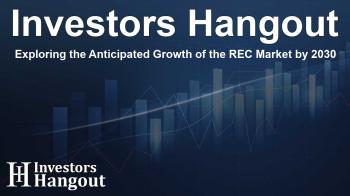Exploring the Anticipated Growth of the REC Market by 2030

The Bright Future of the Renewable Energy Certificate Market
The Renewable Energy Certificate (REC) market is poised for tremendous growth, projecting an increase from USD 27.99 billion to USD 45.45 billion by 2030. This impressive rise, at a compound annual growth rate (CAGR) of 10.2%, underscores a pivotal shift in energy solutions globally. Organizations are placing greater emphasis on sustainability, reflecting a broader trend toward environmental responsibility. Regulatory changes and consumer demands alike are steering companies to adopt more sustainable practices, making RECs an essential element in this transformative journey.
Understanding the Role of Renewable Energy Certificates
Renewable Energy Certificates serve as a crucial mechanism that allows businesses and individuals to track their renewable energy usage. By purchasing these certificates, users can substantiate their commitment to using clean energy sources like solar, wind, and hydro. As companies strive to align their operations with eco-friendly practices, the demand for RECs continues to rise, offering a viable path to reduce greenhouse gas emissions.
Influencing Factors Driving the Market
Several factors are propelling the growth of the REC market. Foremost among these is the increasing investment of corporations in renewable energy projects. Moreover, government policies mandating renewable energy targets create a structured environment that supports power generation from renewable sources. These types of policies not only reinforce the market for RECs but also encourage more businesses to participate in sustainability efforts.
Understanding the Market Dynamics
The dynamics shaping the REC market also present various opportunities and challenges. Government initiatives aimed at reducing emissions and enhancing renewable energy outputs are pivotal drivers. However, it's essential to acknowledge the constraints presented by fluctuating prices of renewable energy certificates, which can vary due to market conditions.
The Importance of Key Players in the REC Market
A diverse group of companies plays a critical role in the REC ecosystem. Major players include 3Degrees, Inc., Shell Energy, EDF Trading Limited, ENGIE, and others. These organizations are not only facilitating the trade of RECs but also driving innovation within the sector. Their collective efforts help foster growth, enhance the market's stability, and ensure a robust framework for renewable energy usage.
Regional Growth Trends
The Asia-Pacific region has emerged as a significant contributor to the REC market, investing heavily in renewable energy generation, especially solar and wind. Countries like China, Japan, and Australia have implemented various incentives and frameworks, such as feed-in tariffs and REC programs, accelerating the shift towards cleaner energy sources. This focus on RECs is laying the groundwork for a more sustainable future across the region.
Looking Ahead: Challenges and Opportunities
As the REC market expands, it faces unique challenges. Standardization gaps and issues like duplicate counting could hinder progress unless addressed proactively. However, the horizon is bright; increasing investments in clean energy projects create new opportunities to overcome these challenges. The commitment to renewable solutions signifies a strong market direction that encourages a transition to more sustainable energy practices.
The Future of Renewable Energy Solutions
Looking ahead, the significance of RECs will only amplify as sustainability becomes paramount in global agendas. With the world striving for cleaner energy, the promotional role of RECs in renewable energy adoption is undeniable. They offer a pathway for stakeholders to engage actively in fostering a cleaner environment while driving the renewable energy revolution forward.
Frequently Asked Questions
What are Renewable Energy Certificates (RECs)?
Renewable Energy Certificates are tradable commodities that represent proof that electricity was generated from renewable energy sources, serving to incentivize the production and use of green energy.
Why is the REC market projected to grow?
The REC market's growth is driven by increasing corporate sustainability initiatives, government mandates for renewable energy targets, and heightened consumer interest in green products.
Who are the key players in the REC market?
Major players include companies like 3Degrees, Inc., Shell Energy, EDF Trading Limited, and ENGIE, each contributing to the trading and development of RECs.
What challenges does the REC market face?
The REC market faces challenges such as price fluctuations and the need for greater standardization to avoid issues like duplicate counting.
How are countries facilitating the REC market?
Countries are implementing various mechanisms including feed-in tariffs and structured REC programs to encourage renewable energy generation and trading.
About The Author
Contact Olivia Taylor privately here. Or send an email with ATTN: Olivia Taylor as the subject to contact@investorshangout.com.
About Investors Hangout
Investors Hangout is a leading online stock forum for financial discussion and learning, offering a wide range of free tools and resources. It draws in traders of all levels, who exchange market knowledge, investigate trading tactics, and keep an eye on industry developments in real time. Featuring financial articles, stock message boards, quotes, charts, company profiles, and live news updates. Through cooperative learning and a wealth of informational resources, it helps users from novices creating their first portfolios to experts honing their techniques. Join Investors Hangout today: https://investorshangout.com/
The content of this article is based on factual, publicly available information and does not represent legal, financial, or investment advice. Investors Hangout does not offer financial advice, and the author is not a licensed financial advisor. Consult a qualified advisor before making any financial or investment decisions based on this article. This article should not be considered advice to purchase, sell, or hold any securities or other investments. If any of the material provided here is inaccurate, please contact us for corrections.

